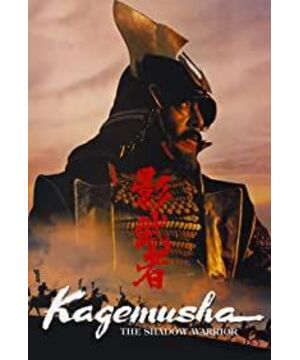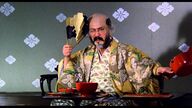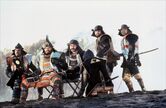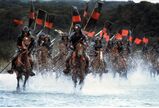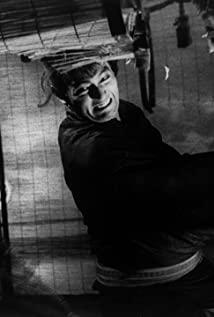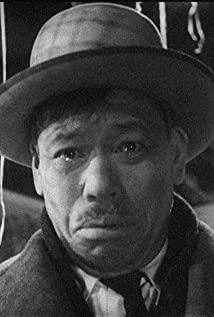Takeda Shingen appeared three times in the film, and the director showed his charisma from three angles. This foreshadows the loyalty of the retainers, the jealousy of his son Takeda Katsurai, and the shadow warrior as a substitute, lost himself, and finally prepared to die.
For the first time only Takeda Shingen, his younger brother Takeda Shinren and Shadow Warrior. The plot of the story unfolds in the form of simple dialogue. First, he explained the origin and identity of the shadow warrior, and then used the vulgarity and wretchedness of the shadow warrior to compare the magnanimity of Takeda Shingen. At the same time, we have seen the side of shadow warriors who dare to act and be chivalrous, so it is convincing that shadow warriors are convinced by Takeda Shingen's personal temperament. The second time, Takeda Shingen saw the letter that his subordinates were preparing to retreat, and he was furious. He was willful and domineering like a child, and he made no secret of his emotional gaffe. After the retainer sternly reprimanded him and told him that he would not retreat when things turned around, Takeda Shingen's mood improved immediately, he sincerely accepted the criticism, and even felt embarrassed for his recklessness just now. Prove that he is a man who is frank and willing to accept correct opinions. After the third time he was injured, he felt that time was running out. For the sake of the Takeda family, he asked to hide the news of his death for three years, proving that he had a clear view of his role and the future situation. He was a strategic, far-sighted and insightful leader. By.
In the subsequent plot, the shadow warrior through the modest training of Takeda Shinlian, and the love of his grandson's admiration, developed a strong sense of identity with Takeda Shingen himself, and slowly completed the internalization. Takeda Katsurai's provocative act of requesting to send troops, I think Shadow Warrior refused because he put himself into Takeda Shingen, and this just angered Takeda Katsurai. He felt the pressure that his father brought him when he was alive, so he would attack the city that his father did not take down. Otherwise, he only needs to disobey the Shadow Warrior and fight back against the provocation. And the retainer, because he was afraid of his defeat, let the shadow warrior sit in command, and the effect was very good (this is really a wonderful arrangement in the plot). The enemy was frightened, the city was also captured, and the position of the shadow warrior was once again stable. But in Takeda Katsuray's heart, he felt a deeper despair than before. This also laid the foreshadowing of the tragedy for him to go his own way after clearing the shadow warriors. He can only overcome his father's shadow and bring his subjects into submission by fighting a battle completely without his father's participation, and winning. But the retainer did not understand this and did not give him the opportunity. But on the other hand, without the participation of the Shadow Warrior, it is completely impossible to win this battle based on his emotions. The retainers had already expected it, so it was inevitable to support him, and they didn't want the career arranged by themselves to be ruined by this ignorant son. But this battle, like a rehearsal, allows us to see a result - Takeda Katsurai will eventually be destroyed by his own emotions, and the career of the retainer will also be destroyed by this person.
How could Takeda Shingen's generation of bright masters educate such a paranoid son? This is what I am more puzzled about. Looking at his subordinates and family members, none of them are the same as Takeda Katsuyoshi. Maybe he has such a tendency in essence, or because he lacks his father's care and affirmation, he can only gain his father's love through his own strengths, that is, the victory of the battle. However, he was neither calm enough nor thoughtful, and his character dominated by likes and dislikes fundamentally prevented him from being favored by his father. Victory in many battles is useless and will only deepen his further extremes on this road. I think this is the fundamental reason why Takeda Shingen did not designate his heir. And the facts also proved this. After he inherited the family, he immediately ruined it in a desperate attempt.
Shadow warriors have not made any mistakes in many major occasions, and even do better, so their hearts will naturally expand. Once people overestimate their own opinions, they will challenge things they dared not do before, even objective facts. This proves that overestimation is not overestimation, but a more correct view. But the ending is often cruel, falling off the horse to reveal his identity, completely ruining his stand-in status. It is an objective fact that the horse recognizes the owner, it is also an objective fact that the shadow warrior is not Takeda Shingen, and it is also an objective fact that the horse is Takeda Shingen’s mount. If a shadow warrior who is not the owner of the horse rides a horse that recognizes the owner, the success rate may be the same as a person sitting on a chair trying to lift himself up. (How does a horse identify its owner?)
Why the shadow warrior would want to ride a horse, the above mentioned his inflated desire to conquer. He has conquered invincible enemies and staff, a mere horse, or an animal, but now it is a stumbling block in his heart, and he must cross this threshold in order to "become" Takeda Shingen. (But isn't your wife and concubine also conquered?) But from another point of view, he has almost become Takeda Shingen, so his approach is becoming more and more like Takeda Shingen.
The cutoff of the waterway made Takeda Shingen very happy, so he wanted to go to the scene to listen to the flute. Whether there is a flute is more meaningful for morale, but he can listen to the report of his subordinates, and he does not have to go to the scene. Secondly, even if he wants to listen, for the sake of safety, he doesn't have to put on a show, just go quietly in the middle of the night, but these two points are not in line with his character. His curiosity, thirst for knowledge, and self-confidence must have led him to do so, only to end up dying for this very unnecessary thing.
Judging from the comparison of these two things, Shadow Warrior's performance of Takeda Shingen has come to the finishing touch, that is, inner unity. This step is different from his rejection of Takeda Katsurai to send troops at the meeting. Although he decided that matter himself, he made it based on external factors and objective conditions. It was only a correct decision based on a balance. But the two things, riding a horse and listening to the flute, are completely controlled by one person's own desire to do one thing. There is no external pressure and no external driving force, they can totally not do it without any problem. But they have to do it again, because that's how the id feels. When the id feels no danger, it will naturally come out to dominate a person's behavior. Therefore, as long as the horseback riding incident occurs, the shadow warrior will inevitably lose his identity as a stand-in, and will definitely go to death--consistent with Takeda Shingen's ending.
After a row of muskets was fired, the second round of bullets was shot intensively from the gaps in the fence. There is not a single shot in the middle of the battlefield, we can only hear the neighing of the horses and the sound of heavy falls. I saw the flame-breathing eyes of the shadow warrior hidden in the woods, his incredible expression, and Takeda Katsurai frantically waving his military mate, the violent and frantic figure set off by the blood-red background.
What a bloody carnage going on on the battlefield, we didn't see anything, but we felt it. Our nerves are tense, we are suffering, like a drawn bow, constantly being pulled bigger and fuller. It wasn't until the warrior behind Takeda Katsuyari started to flee in panic and he fell heavily on the chair, we knew it was over, over.
"Whoosh-", the arrow was shot steadily, the target seemed to be infinite, or there was no target at all, as long as it flew. Against the background of the extremely fast arrows, we saw the war horse slowly fall down in slow motion, and struggled to stand up again, fell again, and struggled again. The blood-covered infantry and the cavalry were already indistinguishable. They staggered and fell down like dead trees. No one raised the Fenghuolin flag anymore, they lay dirty on the ground next to their dead master.
The shadow warrior's eyes were already red as if they were burning, and they turned around in a hurry like a trapped beast. This is his Takeda family, his troops, his life! However, being lost like a game by an incompetent person, he couldn't say a word. If the person was already dead when he was kicked out of the house, now his heart is also dead.
It was raining heavily that day, and he shrank his neck like a wronged child, standing humbly at the gate. He was scolded, insulted, kicked and beaten by the family, and he didn't care anymore. He just wanted to take another look at his grandson, but was mercilessly laughed at. The pace of his departure was so heavy that it seemed that he couldn't move his legs, but they thought he was walking too slowly and threw him with stones. If it weren't for him, the Takeda family would have ended three years ago, and these people don't appreciate him at all. They feel that they have been teased by this scoundrel for three years, and they can't swallow it. When we saw this scene, we should have been very angry. These family members actually took revenge for their kindness, and they must not end well. But I think this scene is a foreshadowing and rendering for the final shadow warrior. He made so much credit, yet suffered so much humiliation, doesn't he hate it in his heart? When the Takeda family was wiped out, he should be happy, but instead of being happy, he was more miserable than any other Takeda family. Even if he is a kind person, this kind of action is completely beyond the motives of others. Just because of this contrast before and after, once again proved that he has internalized into Takeda Shingen himself.
So the last scene, on the surface, is the solo dance of the shadow warriors, but it is actually the solo dance of Takeda Shingen. The battle is over, what is he going to do on the battlefield? Just to die, no, he was looking, looking for something that belonged to him. Not on the battlefield, so where is it, in the water, is the mountain flag, the flag of Takeda Shingen. He finally came to his place, stretched to die in the water, and called the curtain for the end of his era.
Shadow warriors live by themselves and die by others.
View more about Kagemusha reviews


